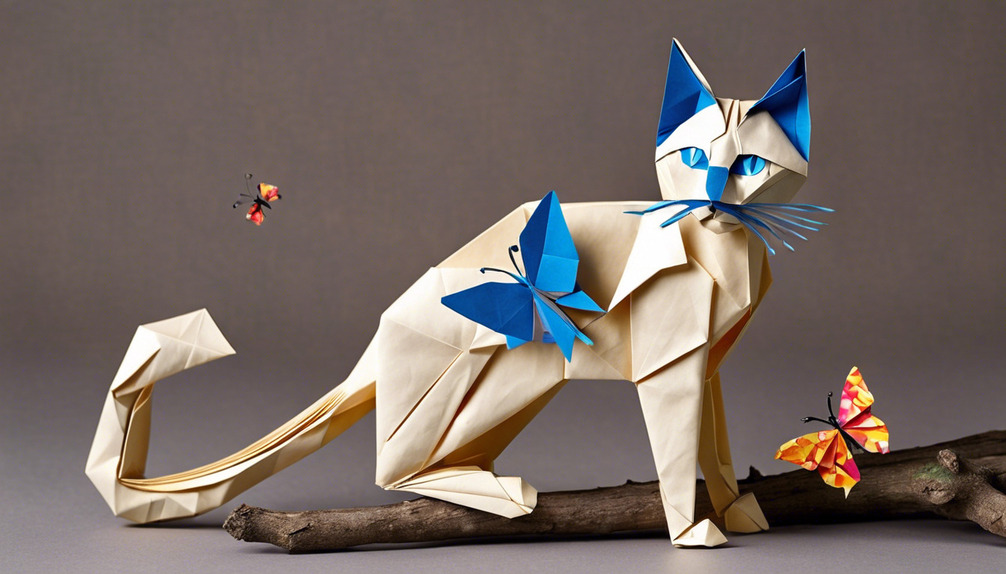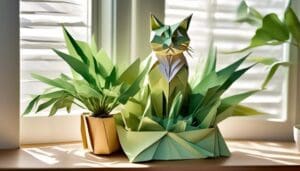As your cat ages, their eyes tell a story of years spent basking in sunbeams and chasing feathered toys; yet, with this passage of time comes the need for extra care and vigilance to maintain their vision health. You’re not alone in wanting the best for your cat, and understanding how to support their eyesight can make all the difference as they enter their golden years.
Regular veterinary check-ups, tailored nutrition, and a watchful eye for any signs of discomfort or change can serve as the cornerstones of preventative eye care. But what specific steps can you take to ensure the twinkle in your cat’s eyes remains as bright as their curiosity?
Consider the subtle changes you might observe in their behavior or appearance that could hint at more than just the natural aging process.
Key Takeaways
- Regular veterinary check-ups are crucial for detecting and managing health issues that may affect a cat’s vision.
- Nutritional enhancements, such as amino acids, vitamins, and omega-3 fatty acids, can support and improve eye health in older cats.
- Gentle eye cleaning using veterinarian-approved solutions helps maintain optimal vision health.
- Engaging in activities that stimulate the senses, such as gentle play and puzzle feeders, can contribute to maintaining the health of a cat’s eyes.
Regular Veterinary Checkups
As your cat grows older, their eye health can be a tender issue. Yearly vet visits play a pivotal role in detecting and managing health issues that may affect their sight.
When you’re devoted to serving your cat, these checkups become acts of love. They ensure that any changes in their vision are caught early, which is crucial for effective intervention. If you notice your cat bumping into furniture, or if their eyes appear cloudy or inflamed, it’s time to seek veterinary care without delay.
Discuss with your vet the best course of action to preserve your cat’s eyesight. They may suggest medications or treatments tailored to your cat’s needs.
Nutritional Enhancements
To bolster your older cat’s vision, consider integrating specially formulated nutritional enhancements into their diet. As your cat ages, their eyes need extra care to stay sharp and clear. It’s not just about love; it’s about providing the building blocks their bodies require. The right amino acids, vitamins, and omega-3 fatty acids found in high-quality cat food and supplements can make a world of difference.
When you’re selecting products for your beloved pet, look for those that contain natural ingredients and are easy for your cat to take. Your vet can help you find the perfect match for your cat’s unique needs, ensuring that each meal supports their sight.
Consider these heartfelt touches to your cat’s routine:
- A daily supplement rich in taurine, an amino acid crucial for eye health.
- Cat food enhanced with vitamin A and C, nurturing their vision with each bite.
- Omega-3 fatty acids to provide support against age-related vision decline.
Your cat’s eyes are windows to their soul, reflecting years of love and trust. By serving them with the best nutritional enhancements, you’re honoring the life and love you’ve shared. Always remember, a regular check-up with the vet ensures these additions are truly benefiting your cat.
Managing Underlying Conditions
While proper nutrition plays a critical role in maintaining your older cat’s vision, it’s equally important to address any underlying health conditions that could affect their eyesight. Regular veterinary check-ups and comprehensive blood work are vital in monitoring for conditions such as high blood pressure, kidney disease, or hyperthyroidism, which are often associated with vision issues in aging felines.
These underlying causes, if left unchecked, can lead to serious complications including retinal atrophy, a condition that may severely impair vision. Fortunately, there are oral medications available, which a compassionate vet can prescribe to help manage these conditions. These treatments can’t only prevent the progression of vision problems but may also improve overall eye health.
Eye Cleaning Techniques
Ensuring your beloved cat maintains optimal vision health as they age involves gentle, regular eye cleaning, a crucial aspect of their overall care. As a devoted caregiver, it’s important to understand the tenderness required in this practice.
Use a damp cloth to gently wipe around your cat’s eyes, being cautious to avoid direct contact with the eye itself. This simple act of love can prevent the accumulation of dirt and discharge that may lead to discomfort or eye infections.
Here are a few compassionate tips to remember when performing eye care:
- Always use a separate area of the cloth for each eye to protect against the spread of infection.
- Seek out veterinarian-approved eye cleaning solutions to maintain the delicate balance of your cat’s eye health.
- Be vigilant for signs of trouble, such as excessive tearing or redness, and seek veterinary guidance promptly.
Regular eye cleaning not only serves as a preventative measure but also provides a moment of bonding between you and your cat. It’s a testament to the nurturing spirit you possess, reflecting the depth of your commitment to their well-being.
Adjusting Home Environment
As your cat’s guardian, you’ll want to illuminate their world with enhanced lighting solutions that make it easier for them to see.
Removing obstacles and making sure paths are clear will help your cat move around easily.
Enhanced Lighting Solutions
To help your older cat see better, make your house brighter with more lights to make moving around easier and safer. As ocular health can decline with age, including the degeneration of the retina, enhanced lighting solutions can significantly alleviate the challenges of vision loss. Your tender care can transform their world from shadows into a place of comfort and ease.
Illuminate their favorite resting spots with a warm glow, reminding them they’re never alone.
Softly light the way to their necessities, affirming their dignity and independence.
Ensure stairs are well-lit, safeguarding their every step with your watchful love.
Every light you provide is a sign of hope for them in their old age, helping them enjoy each day.
Obstacle-Free navigation Paths
To help your aging cat feel more comfortable and confident moving around, it’s important to keep your home layout consistent and easy to navigate. Since older cats can have vision problems, it’s essential to clear any obstacles that could be in their way. Doing this not only helps your cat move around more easily but also shows how much you care about their health and happiness.
| Strategy | How it Helps Older Cats with Poor Vision |
|---|---|
| Consistent Furniture | Prevents confusion and reduces accidents |
| Easy Access Essentials | Helps find food, water, and litter. |
| Scent Markers | Helps in familiarizing surroundings |
| Introducing Obstacles | Do so cautiously with sound cues |
| Vet Guidance | Provides customized strategies for finding your way. |
Vision Supplements
Caring for your aging cat’s eyes involves more than just keen observation; vision supplements packed with essential nutrients like taurine and omega-3 fatty acids can be a cornerstone of their ocular health. Senior cats often face challenges that affect their sight, and understanding the causes of vision decline is crucial in supporting their well-being. Vision supplements can be an integral part of maintaining a healthy immune system and ensuring your dear cat retains their ability to see the world clearly.
When you’re considering how to nourish your cat’s eyesight, remember these heartfelt points:
- Essential Nutrients: Vision supplements containing taurine, vitamin A, and vitamin C nourish the eyes deeply, fostering a sparkle in your cat’s gaze.
- Omega-3 Fatty Acids: These fats support retinal function and may help combat age-related vision issues, keeping your cat’s sight as sharp as their instincts.
- Grape Seed Extract: Acting as an antioxidant, it offers additional protection against the oxidative stress that contributes to eye health decline.
It’s important to consult your veterinarian to choose the best vision supplements, taking into account the quality of ingredients and ease of administration, tailored specifically to the needs of your beloved senior cat. Your dedication to their health highlights the tenderness of the bond you share.
Engaging in Gentle Play
A little playful interaction can go a long way in keeping your older cat’s senses sharpened and their spirits lifted. Gentle play isn’t just about fun; it’s about maintaining the health of your beloved cat’s eyes. When you engage your cat in activities they adore, you’re not just passing the time—you’re enriching their golden years with purpose and joy.
You can create an environment that stimulates your cat’s vision and keeps them mentally agile. Use toys that appeal to their senses, like those that make sounds or carry intriguing scents. Activities such as a soft wave of a wand or a slow game of chase the kibble can be deeply satisfying for your older cat, providing gentle exercise that’s just right for their pace.
Take a moment to consider these simple yet impactful activities:
| Activity | Benefit | Emotion Evoked |
|---|---|---|
| Wand Tease | Stimulates cat eye health | Joyful Anticipation |
| Scented Toys | Engages the sense of smell, complementing vision | Comforting Familiarity |
| Puzzle Feeders | Promotes mental stimulation | Intrigued Engagement |
Your time and tenderness in these shared moments are priceless. They serve as an affirmation of your dedication to your cat’s well-being, ensuring they stay as bright-eyed and content as possible, for as long as possible.
Signs of Vision Trouble
You might notice your beloved cat’s eyes appear a bit cloudier than before, a subtle sign that they could be facing vision challenges.
If they’re bumping into furniture or seem unsure when navigating familiar spaces, it’s time to pay extra attention.
Observing any behavioral shifts, like hesitation at the threshold of a dimly lit room, can be your cue to seek veterinary guidance.
Cloudy Eyes Detection
Often, the first sign of vision trouble in older cats is a noticeable cloudiness in their eyes, which warrants immediate attention from your veterinarian. This cloudiness could indicate serious conditions like cataracts or glaucoma, which, without prompt cat eye help, may cause blindness. Cloudy eyes detection is critical for maintaining your beloved cat’s quality of life.
- Seek comfort in knowing: Early intervention can prevent irreversible damage.
- Feel empowered by acting: Regular check-ups can catch eye infections before they worsen.
- Hold onto hope: Treatments are available to manage or even improve your cat’s eye health.
Behavioral Changes Observation
Monitoring your cat’s behavior closely can reveal early signs of vision loss, such as hesitation when navigating familiar spaces or clumsiness. It’s important to approach these signs with a compassionate heart, as they may indicate issues with the optic nerve or other eye problems. By observing your cat, you can avoid startling them as their vision changes.
Keep an eye out for aimless wandering or frequent bumping into objects, which can be part of a behavioral changes observation. If your cat’s eyes appear cloudy, red, or have discharges, don’t hesitate to seek veterinary care.
A reluctance to enter dark areas or pawing at the eyes warrants a check-up. Using a flashlight, look for any opaque haze which could suggest cataracts.
Your attentive care can make a significant difference.
Bumping Into Objects
While it’s natural to worry when your cat hesitates in familiar surroundings, consistently bumping into objects is a more concrete sign that their vision may be declining. It’s hard to see your beloved cat struggle, but recognizing these signs is the first step to getting them the help they need. Prompt action may prevent further deterioration in cases where conditions like retinal detachment can lead to blindness if left untreated.
- Heart-wrenching Reality: Witnessing your cat is blind, or losing sight, can be a profound emotional journey.
- Silent Pleas for Help: Every bump into furniture or walls is a silent plea for your help and understanding.
- Guardian’s Role: Your vigilant observation and quick response can be the difference in protecting their remaining vision.
Preventative Eye Care
To shield your aging cat’s eyesight, regular veterinary exams are essential for catching and treating common vision conditions early. In the compassionate journey of caring for your beloved cat, understanding the role of preventative eye care is paramount. It’s not just about responding to health issues as they arise, but actively seeking to prevent them.
By keeping your cat’s eyes regularly checked, you’re employing one of the most caring acts in veterinary medicine. This proactive step allows for the early detection of potential problems, ensuring that any necessary treatments can begin promptly, thereby preserving your cat’s precious sight.
Remember, the care you provide goes beyond these exams. Vaccinating your cat when they’re young is a cornerstone of preventative eye care, potentially averting vision-threatening conditions before they take hold. Maintaining a consistent daily routine and familiar environment can make a world of difference for a cat whose vision may not be what it once was.
Nutrition is important. Select a diet designed for older cats to improve their health, including their eye health. Regularly clean around their eyes to prevent infections. Your careful and consistent care greatly benefits your cat’s health.
Frequently Asked Questions
Can a Cats Eyesight Be Restored?
You’re wondering if a cat’s eyesight can be restored. While some conditions are treatable, restoring vision depends on the underlying issue. It’s best to consult your vet for personalized advice and treatment options.
How Can I Heal My Cats Eye Naturally?
To heal your cat’s eye naturally, you’ll need a gentle touch. Start with a warm compress to soothe irritation. Then, consider chamomile tea rinses—they’re safe and can reduce inflammation and discomfort.
What to Do When Your Elderly Cat Goes Blind?
When your elderly cat goes blind, gently guide them through their familiar spaces, and ensure they’re comfortable and safe. Consult your vet for advice to maintain their well-being and happiness.
What Vitamins Are Good for Cats Eyes?
You’ll find vitamins A, C, and E, along with taurine and omega-3s, are great for your cat’s eyes. They help maintain vision and may prevent issues, so consider these in their diet.




